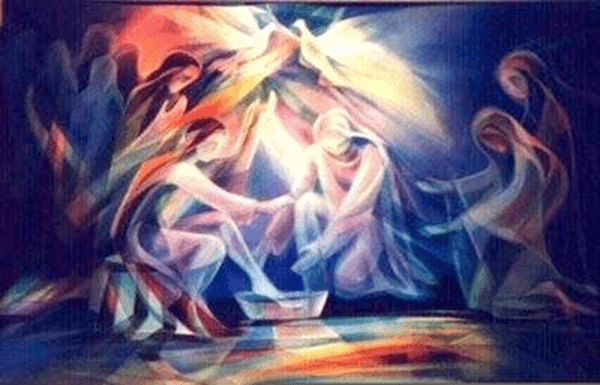
Chloe was a bit nervous as it was her First Washing of the Feet. The small church in Smyrna endured the vicissitudes of history and after 2000 years of history, was now the only church inspired solely by John’s Gospel in all Christendom.
First Washing of the Feet Day was the day in which Chloe would fully participate with the rest of the community, in the Eucharist. It was not an easy path. Chloe had to go through a very practical preparation, some special sessions on empathy, respect, acceptance...
She had to join several groups who would distribute food to some homeless in the big city, help at a dispensary in the sketchy part of town, participate and prepare a program for women’s empowerment, and still contribute as a volunteer in an environmental awareness project.
She felt how important this moment was: The big thanksgiving, the Eucharist. She wanted to make Jesus present in service as reminded by her, now almost memorized, through the Eucharist reading read a million times during every Sunday at the Eucharistic Gathering. The words of consecration. Jesus’ final action and instruction during the Last Supper: «After he had washed their feet, had put on his robe, and had reclined again, he said to them, “Do you know what I have done to you? You call me Teacher and Lord, and you are right, for that is what I am. So if I, your Lord and Teacher, have washed your feet, you also ought to wash one another’s feet. For I have set you an example, that you also should do as I have done to you John» (13: 12-15).
She liked it. In service and through service she felt connected to Jesus. It was not so much about creeds and dogmas; it was about a commitment to service. What a beautiful way to make Jesus present into the world!
Of course, Chloe knew about the other Eucharistic traditions originating from the Synoptic Gospels (Matthew, Mark and Luke.) She knew that for them the bread and the wine were at the center of the Sacrament. But Chloe always thought that the Johannine vision of the Eucharist, through the Washing of the Feet, was as meaningful, at least to her.
That Sunday when people lined up for the moment of the Washing of the Feet, Chloe was thrilled: Seven elders, at the back of the church, not wanting to be at the center, began washing the feet of the seven candidates, who in turn washed the feet of other seven people, and they washed seven more people, so that they all washed each other’s feet, as commanded by Jesus in John’s Gospel. The Eucharist took time, as it does every Sunday really. For Chloe though, it was a moment of commitment and a moment of joy. From that day on, service was to become central to her life, whether in the community, at the church or in her family. She knew that service was at the core of her faith. Service, she thought, is the way to bring Jesus to others and she felt ready for it.
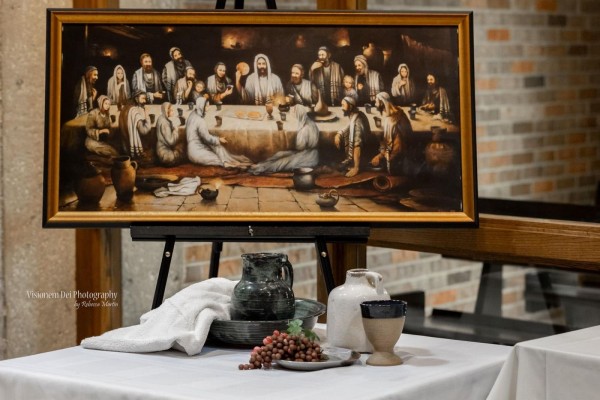
On Holy Thursday, we traditionally celebrate the Passover, the institution of the Eucharist, and the institution of the priesthood. The Holy Scriptures we read for this celebration invite us to reflect on these mysteries. The book of Exodus narrates the Passover when the people of Israel prepared for their journey out of slavery. That crucial moment right before they set out on the road to the promised land. A dream come true: freedom. The promised land for the people of Israel is freedom and abundance. God heard the cry of his people’s suffering. God, in his deep love for his people, did something unexpected: he found an ally, Moses, and faced the power of Pharaoh to free his people—a gesture of love and commitment to his covenant with his people. For us Christians of the 21st century, this holy night should help us reflect on the use of our freedom and the abundance that some of us enjoy and millions of people do not have. How can I, from my little corner of the world, push for the Lord’s dream and promise of a land of freedom and abundance for all to come true? Am I willing to partner with God to fight against the world’s injustices out of love for others?
Saint Paul’s letter to the Corinthians tells us the words of the Last Supper that Jesus shared with his followers. In that intimate moment of sharing, Jesus gives himself to us as food for the journey of life. In that gesture of love, Jesus leaves us, his disciples, a sign of total dedication so that we remember him every time we share the Eucharist. In a world where many fears and misinformation abound in social media, the Lord’s example reminds us to value the gift of self without fear and sincerity.
But the most unexpected thing about the celebration of Holy Thursday is the gospel we read. Every Holy Thursday, we are reminded that the Lord, while at the table with his disciples, put on a towel and began to wash his disciples’ feet. This was unexpected for his disciples, who had just experienced the triumphal entry into Jerusalem. They were acclaimed by those who awaited the “triumphant messiah.” Suddenly, in an unplanned moment, Jesus begins to wash the feet of each one of them. Judas, who betrayed him and sold him for 30 coins. Peter, who denied him when things became difficult. Thomas, who struggled to believe in the promise of the Resurrection. John and James, who wanted a place of power and honor. To all of them, one by one, Jesus washed their feet and showed them a love that overcomes all their flaws. His love for them is greater than their pettiness. As Jesus washes his disciples’ feet, he teaches that love in its purest form is service.
The unexpected actions of Jesus’ love for his disciples urge us to dream of a new world with freedom and abundance for all, not just for the few. Jesus’ unexpected self-gift in the Eucharist invites us to make our Christian lives a gift in service to our brothers and sisters. The humble and simple gesture of the teacher invites us to understand that authentic leadership is done in service. For followers of Jesus, the Eucharist discovers its most profound meaning when our lives are spent in service and dedication to others.
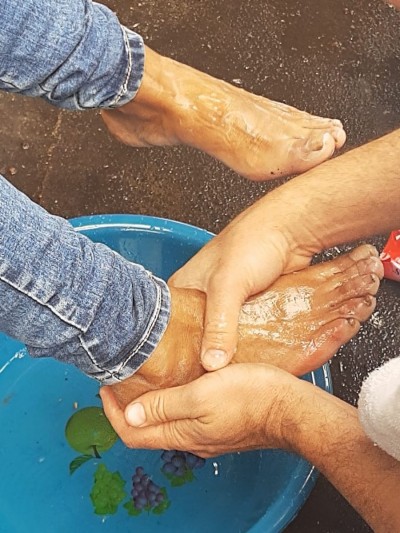
At the heart of the Holy Week we encounter Holy Thursday, a day defined by the celebration of the paschal supper of Jesus with his disciples, and the promulgation of the Commandment of Love. This is, no doubt, a heartbreaking day, in which the drama that is going to unfold in the coming days is being anticipated.
Today’s liturgy revolves around Memory: the reading of the book of Exodus remembers the salvific action of God in Egypt; Saint Paul in his letter remembers the last supper of Jesus; and Saint John in the Gospel remembers the washing of the feet and the example of service that Jesus established with his disciples. The Eucharist is therefore instituted as a remembrance, underlined by the following words: “Do this in memory of me”.
Those of us who are taking part today and any other day in a eucharistic celebration are being summoned to reenact “this”, which is no other thing than a life devoted to the service of our neighbor, serving, and not being served, the life of the one who “loved us to the end”, as today’s Gospel tells us.
The last supper defines therefore Love as Service, not as Sacrifice, for the sacrifice of Jesus on the Cross was given once and for all and does not need repetition. True Christian worship is not, as one may think, the celebration of rites and sacraments, but the loving care of our neighbor which is being carried out as gratitude for the Love received. “If I, therefore, the master and teacher, have washed your feet, you ought to wash one another’s feet. I have given you a model to follow, so that as I have done for you, you should also do.”
The most powerful homily of Jesus are his actions, beyond his words, for he preaches with his deeds: the washing of the feet shows us the way towards evangelizing, which is living in service and preaching with our example, with prophetic gestures, full of the tenderness and humility that this passage in the Gospel of John depicts.
This Holy Thursday we are invited to commit with the true Christian worship: serving our neighbor, not in the temple, nor at the altar, but kneeling in front of those who walk with us the journey of life.
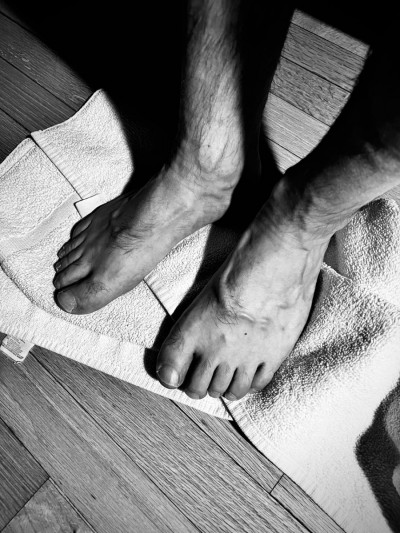
This past Tuesday I led a reflection about the role of Judas, Mary Magdalene, and Peter in the passion narrative for the Catholic Community in Central Racine. We discussed the meaning of the washing of feet that we have ritualized for Holy Thursday liturgy. Using Lectio Divina and with the help of some biblical anthological insights we reflected on Judas’ person first. I started the discussion asking people, have you ever thought about Jesus washing the feet of Judas? Every Holy Thursday we read the account of the washing of feet from the gospel of John 13:1-15. At the beginning of the narrative, we read that Judas is present there, decided to hand Jesus over to the religious authorities. It is after the washing of the feet and after receiving bread from Jesus that Judas leaves the room (John 13:30). This means that Jesus washed Judas’ feet and shared bread with him. According to the gospel of John, Jesus knew that Judas would betray him. This makes the image of Jesus washing Judas’ feet even more striking.
For many of us, Judas is only the betrayer. If we are left only with the story of the passion, especially from the gospel of John, Judas is a thief (John 12:6) and someone induced by the devil and even possesed by Satan (John 13:2; 13:27). Equally infamous are the kiss of Judas found in all three synoptic gospels (Mark 14:45; Matthew 26:49; Luke 22:47), and the thirty coins of silver that accepted to betrayed Jesus (Matthew 26:15). Matthew and Luke differ on how he died, but Matthew’s version (27:5) of Judas taking his own life is the most popular one. I would suggest you also read Luke’s version (Acts 1:18).
We can only but imagine how Jesus felt washing the feet of someone who will betray him. But Judas was certainly more than that. His feet were not only the feet of a betrayer but the feet of one who brought good news. Judas was commissioned with the other disciples by Jesus to proclaim the gospel (Mark 6:7-11; Cf Matthew 10:1; Luke 9:1-5). Judas even received power to cure illnesses and he with the other disciples reported how successful they were! (Mark 6:12-13, 30-31). For some people he was not the betrayer, but Judas the Healer, or Judas the Apostle, Judas the instrument of God’s grace and love. His feet not only walked the way of betrayal but the way of successful mission of caring for the poor and the sick. Judas’ feet brought good news and healing into the life of others, and I think that is something Jesus did not forgot as he washed them. I am aware this is the area of speculation but the image of Jesus washing his disciple’s feet is one worth praying and thinking about.
Bruce Malina in his Social-Science Commentary on the Gospel of John (1998, 223) says that traditional Mediterranean anthropology understand the human experience within three zones of interaction: eyes-heart, mouth-ears, hands-feet. The last pair represents our actions, performance, doing or making. Malina then suggests that when Jesus washes the disciples’ feet he is washing away, that is forgiving, their wrongdoings even the future ones. This idea makes sense since the beginning of the washing of the feet scene in John begins stating that Jesus loved his own to the end (John 13:1). I like to think that Judas’ feet remind Jesus of how they carried good news and walked dusty roads to bring hope into the lives of others. I would like to finish with a quote from the book of Isaiah as we think of Judas’ feet: “how beautiful upon the mountains are the feet of the messenger who announces peace, who brings good news, who announces salvation” (Isaiah 52:7).
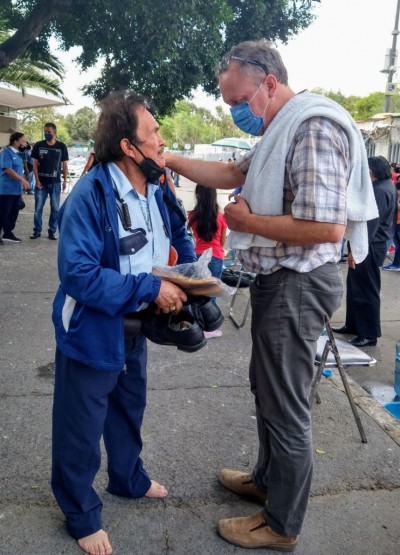
Reviewing experiences of different members of the Community of Saint Paul this past Holy Week, we reproduce here this testimony that Pablo Cirujeda sends from Mexico City.
In the context of the Holy Week celebrations that we organize in the Rectoría del Rosario, in Mexico City, with the support of three other parishes of the deanery, we had the idea of organizing a different footwashing this past Holy Thursday.
For a year we have been cooking and delivering food to the unemployed and homeless population that congregates around the bus terminal and Metro Observatorio stop, right on the parish boundary. This activity takes place every Tuesday and Thursday, and currently we have already been able to share more than 15,000 hot meals.
We planned to carry out a foot washing for Holy Thursday after the delivery of food to all the people who would like to receive this risky and humble gesture of Jesus. After a year walking with this marginal population, there are countless stories and encounters that our pastoral team has treasured with them: stories of violence, marginalization, hope, addictions, struggle, migration...
However, on a daily basis we witness the scarcity in which these people find themselves, and that on many occasions they have asked us for support with clothes, shoes or medicines. How to wash their feet and see that those same feet return to some torn and worn shoes? So, during the Lenten season we collected new or used shoes in good condition among many volunteers and donors, and also socks to complete each pair.
Then, on Holy Thursday, after the delivery of the usual 250 meals at noon, we invited those who had received the meal to have their feet washed by one of the four priests present, or by some volunteers from this community project. One by one they went through this simple ritual, after which we were able to give them a new pair of shoes and new socks.
Thanks to the support of a large group of volunteers from the four parishes that we collaborate with in this project, including a youth choir, the ceremony was carried out with order and great emotion on the part of the people who were presented with their new shoes.
This Holy Thursday, despite the needs generated by the pandemic, we were able to share a little solidarity with some of those most affected by the lack of employment and a decent home.
Reflection on Holy Thursday
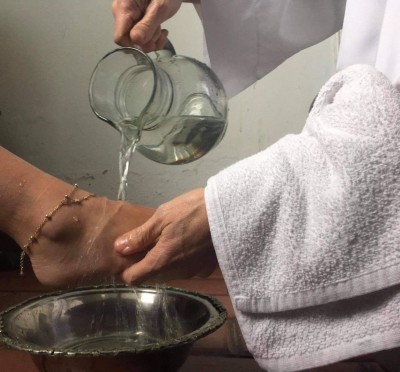
The opening sentence of the Gospel that we read today, in the evening Mass of the Lord’s Supper, serves as a portico for the entire celebration of the Paschal Triduum: «Before the feast of Passover, Jesus realized that the hour had come for him to pass from this world to the Father. He had loved his own in this world, and would show his love for them to the end» (Jn 13: 1). This masterful introduction by John the evangelist is a matchless way to frame all the events that will unfold from here: The Last Supper, the washing of the feet, the prayer and the arrest of Jesus in Gethsemane, his trial, condemnation and crucifixion, his memorable forgiveness of his executioners from the cross, his death and his resurrection. The interpretive key that explains the Lord’s attitude through all these events is that, having loved his friends, he loved them to the end.
Today, as we enter with faith and emotion into the celebration of the central days of the liturgical year, it would not hurt to examine our reaction, both emotional and rational, to this moving statement of the evangelist. When I hear that Jesus «loved to the end,» how do I feel? What do I think?
And it is important to ask those questions because probably we are dealing with one of these Gospel passages that we could quickly dismiss. It would be easy to downplay it and to think, deep down, that it is a fine statement if we apply it Jesus, but that today, here, it is impossible to actually live out. That perhaps is not even desirable. For, what does it mean to love to the extreme? Is it even possible? Is there such pure love in the real world? Is this love that gives it all out actually healthy? Have we not learnt the importance of practicing self-care? And does not psychology teach us that in all acts of love for someone there is a bit (or a lot) of self-interest and self-love? From our experience of the complexity of life we could read this gospel story and think of it as a fable. Beautiful, yes, but fabulous after all. We will read that Jesus loved his friends to the extreme and reduce this phrase, at most, to an ideal. Nice, to be sure, but unrealistic. «In the real world, no one loves like that,» we will tell ourselves.
We will not be completely wrong if we think this way: absolute self-giving is attained by few people. For most of us, fears, selfishness and the pursuit of comfort reduce our ability to fully give ourselves to others. And yet, it is crucial that we realize that we are not facing an impossible horizon. Difficult, yes, but perhaps less distant than we think. There are, around us, in every neighborhood of every city in the world, in every village, in every town, people who love others with admirable dedication and generosity. To the end. The single mother who cares for her children working impossible hours in almost inhumane conditions, the woman who pays a daily and painful visit to her depressed neighbor and takes her for a walk, the grandson who lives with his grandmother, who’s been sick for years, and cares for her without losing his invincible smile, the parents who would do anything for their disabled son, the nun who cares for a group of orphans as if they were their own daughters. None of these examples (or many others that come to mind) is rhetorical or imagined: for each of them I am thinking of actual people who embody it, and whom I have had the privilege to meet. Suddenly, the model of Jesus, loving with a complete surrender, no longer seems so remote or unattainable.
Holy Week, with the contemplation of the Passion of Jesus (the man who loved to the end), could help us—who perhaps during the year let our Christian commitment cool down—to recover something of the passion of the saints. It is worth it: first of all, because having this radical love as our goal and horizon, will lift us up, even if we fall far short of fulfilling it. It will give depth and breadth to our life story. And, secondly, because if we «domesticate» the Gospel too much and try to live the faith without passion, sooner or later we will end up thinking that the Gospel demands a lot in exchange for too little. «He who loses his life will find it,» Jesus said. Only those who give themselves completely, or who at least try, and see self-giving as something possible and desirable, will reap (despite the many obstacles and hard times they will endure) the fruits of knowing that their time and efforts in this world are going somewhere. They will also experience the joy that this conviction brings with it. The absolute self-giving of Jesus, this Holy Thursday, tells us that a radical embrace of the Gospel is the way, also for us. A difficult path, no doubt, but one that will elevate us above our miseries, one that will help us get out of our little worlds, and one that is very much worth it. More than anything in this world.
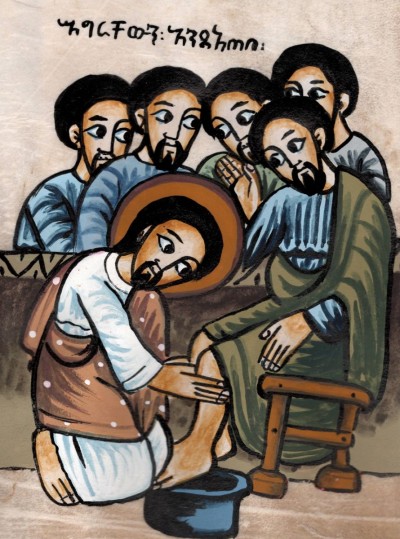
Holy Week 2020 is my first Holy Week as pastor. While I had wonderful experiences in the parish on the southside of Milwaukee where I served as Associate Pastor for three years, there just seemed to be something special about Holy Week as a pastor. For one, being in the Dominican Republic, I was toying with the idea of riding a donkey on Palm Sunday. But what was most on my mind and in my prayer was the foot washing on Holy Thursday. I’d even get emotional thinking about offering that powerful sign of servant leadership for the communities of La Sagrada Familia and also the men in the catechesis program preparing for baptism in the local jail.
But, no donkey. And no foot washing. The former, is of course a bit silly. Still, in terms of a Holy Thursday without foot washing, I have found myself forced to reflect on its deeper meaning and on the “why” of this sign. As such this unsought shaking-up and unique opportunity can serve for a more profound experience of the meaning of this particular sign of Jesus in the Gospel of John that we re-experience every Holy Thursday, except this one.
To begin, I think we all generally agree that service is important not just in terms discipleship, but also just being a decent human being. In all circles, we use the language of “giving back.” Service hours are important for getting college, for scholarships, for jobs, and even as a means of restitution in minor crimes. Parents speak of wanting their children to do some sort of service to “appreciate what they have.” Nevertheless, this Holy Thursday we must ask ourselves the question: What is Jesus referring to when he says to his disciples after washing their feet, “For I have set for you an example, that you should do as I have done to you” (Jn 13:15)? How is this different than a general sense of service being a good thing to do?
First, Jesus wants to demonstrate in the foot washing that a true master serves. He is willing to “lower” himself in order to serve those who follow him. This idea is a reflection of Jesus’ ministry on Earth in the Gospel of John, as the Word or Son who was sent to unite those who “believe” in him in the love of the Father (cf. Jn 15:9-10, 17:21). Therefore, those who believe in Jesus and truly follow him are called to serve, but as a result and expression of love. The commandment that Jesus gives shortly after washing the feet is not to serve for the sake of service, but “Just as I have loved you, you should love one another” (Jn 13:34).
The foundation of this sign is the love the is shared between the Father and Son, and which Jesus was sent in order to share with the world (cf. Jn 3:16). As described by Jesus within the Gospel of John, this is a love that is faithful, loyal and of service “to the end,” (Jn 13:1). Such a sense of fidelity out of love reflects the love of the Father towards the world. “For God so loved the world that he gave his only son… God did not send the Son into the world to condemn the world, but in order that the world might be saved through him,” (Jn 3:16-17). Jesus, who is in the Father, loves as the Father, and his commandment is thus that those who follow him (“his own”) love in this way (cf. Jn 15:9).[i]
This sense of fidelity out of love is made clear in John 15 where Jesus connects the word remaining (or abiding, from the Greek μένω) with love. “…[R]emain in my love. If you keep my commandments, you will abide in my love…” (Jn 15:9-10). And true dedication (remaining) in love that has no end is demonstrated in the full gift of self without limit. “No one has greater love than this, to lay down one’s life for one’s friends” (Jn 15:13). As such, tomorrow on Good Friday, we will see that Jesus makes good on his own message and is faithful to the Father and his promise to us.[ii]
Jesus makes clear that the disciples will show they have learned from and believe in him by being faithful to his commandment to “love one another” (cf. Jn 14:15). They are to follow Jesus’ example, not only of humbly serving as demonstrated in the foot washing, but also as the Word who became flesh and lived within the “world” (Jn 1:14) and loved until the end. And in doing so, the disciples are united in Jesus’ relationship with the Father, who in turn are faithful in their love to the disciples, sending the Advocate to be with them forever (Jn 15-17). In this way, those who believe and are thus moved to follow Jesus are “saved,” (cf. Jn 1:12-13; 20:31).
Sometimes it is necessary to go down to the foundation in order to build something new, or to strengthen what is already there. That is an opportunity that has been given us during this unique Holy Week and it can bear much fruit if we take advantage of it. While most of us cannot celebrate the beautiful sign of the foot washing this Holy Thursday, the current situation does afford the opportunity to find new ways to apply the message contained within it: that of a love that is faithful to the end, to full completion, and based on humble service and complete self-gift, such that others be lifted up. It is service in a way to allow others to see their importance to God and be so moved by it that they respond to that love.
Then, the question for all of us is: How can I serve in the way Jesus taught, now? I do not pretend have an answer here. However, I would like to provide some guidance. It seems to me that what is of upmost importance in Christian service, founded in self-giving love, is its authenticity. We of course can use the different social sciences and models to be efficient and effective. However, if we are calculating to the point of being cold, what we may do is still service, but it is not Christian service. Christian service is one based on relationships – and not so much about the size.
So, on this special holy day in this unique Holy Week, without donkeys or foot washing, let us reflect especially on the small ways that we can live out the central message of the Triduum. Authentic giving of self is how we unite in the love of Jesus, and in doing so, we are united in the love of the Father. It seems to me that the importance of relationships is something that we are coming to appreciate more and more these days; how much more so when in the light of the Easter Candle.
[i] As the Father has loved me, so I have loved you; abide in my love. (Jn 15:9)
[ii] There is in fact a deeper connection in the narration of Jesus “loving to the end” (Jn 13:1) to his last words on the cross than the English translations reflect. Before perishing, Jesus says “it is finished,” (NRSV, NAS, KJV, INT). The root of “end” in 13:1 and “it is finished” in 19:30 is the same, τἐλος, (where the prefix “tele” comes from in telescope or telephone). I simply point it out here because John makes it very clear what is meant by loving “to the end.”
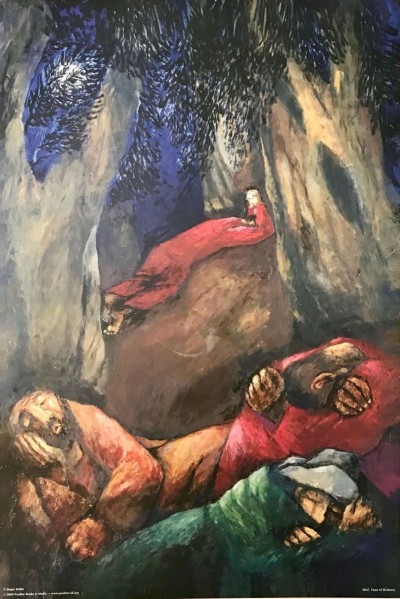
Already in the midst of Holy Week, tonight we begin the Triduum with the celebration of Holy Thursday, the Evening Mass of the Lord’s Supper. There are many ways to approach Holy Week and the Triduum. One of them is considering the different locations, or scenarios in which the Passion takes place. We read the text of the Passion twice during Holy Week: We read the synoptic version on Palm Sunday (Mark, Matthew and Luke) following the annual cycles of the Lectionary (this year we are reading Mark) and John’s version, which we read every year on Good Friday.
The locations of the Passion take us from the entrance of Jerusalem to Jesus’ tomb, going through the house of Simon the leper, the Upper Room, the garden of Gethsemane, the residence of the High Priest, Pilate’s palace and Golgotha. All these places are important, but Gethsemane continues being the place that moves me the most—the place that, in my opinion, gives more meaning to the experience of the Passion.
Following Mark’s account, after the Passover meal, Jesus and his disciples head to Gethsemane. On the way there, Jesus tells his disciples that they are going to abandon him, announces his Resurrection once again, and predicts Peter’s denial. Upon arriving to the garden of Gethsemane, Jesus displays his full humanity. It is in the garden that we witness Jesus’ struggle. Despite being the Son of God, he suffers like a human. We dare to think that Jesus is not suffering so much in anticipation of the physical pain that he is going to endure on the next day; it is a deeper pain, the emotional pain of giving up a full life, of abandoning those he loved. We cannot strip away Jesus’ humanity, we cannot remove Gethsemane from the way to the Cross. The absolute surrender of Jesus to God’s plan makes sense only if we see how Jesus overcomes, once again, the temptation not to be the Beloved Son of God.
To comprehend this last temptation of Christ, we are reminded that after the celebration of Ash Wednesday, we always begin the journey of Lent on the First Sunday with the text of the Temptations. We read Mark’s this year, where the Temptations only take two verses (Mk 1:12-13.) Luke’s is the Gospel that most clearly indicates that, “When the devil had finished every temptation, he departed from him for a time,” (Lk 4:13) a subtle threat that the devil will come back at an auspicious time. And that moment is Gethsemane.
In Gethsemane, before being taken prisoner, Jesus states that he is dying of sorrow. In the garden of Gethsemane Jesus asks his disciples to pray so that they do not fall into temptation. In the garden the scene of the Transfiguration takes place again (as we see also in Matthew’s account.)
Jesus takes apart the same disciples that he took with him in the Transfiguration—Peter, James and John. Jesus then prays out loud to the Father, whom he addresses as “Abba,” begging him to take away that “cup” from him. He then immediately submits to the Father’s will. Just like in the Transfiguration, the disciples have fallen asleep. Jesus rebukes Peter—whom he calls Simon, he has lost his identity—and commands him not to fall into temptation.
What is the temptation that Jesus experienced? If we realize the parallel with the Transfiguration—which we always read on the Second Sunday in Lent, following the Temptations—if we see that Gethsemane is a parallel with the scene on top of Mount Tabor, we know that the temptation is that Jesus, in possession of his absolute freedom, would choose not to act like the Son of God he is, and would decide not to submit to the suffering of the Cross.
In the Transfiguration, the voice of God tells Jesus’s disciples, “This is my Son, the Beloved.” It is a confirmation of Jesus’ identity that is connected to his baptism, when the same voice proclaims the same message in a baptism that, as Jesus is free from sin, could only be of identity. Thus, this is Gethsemane: a new, last temptation of identity (as all the Temptations really were about!) The Son of Man overcomes in an instant the temptation of not being who he is by not submitting to the Cross.
Holy Thursday accounts and recreates this experience in the Adoration that follows the celebration of the Eucharist. From the end of Mass until at least midnight, we prostrate ourselves before the real presence of Jesus, who has been tossed about for an instant between his love for life and his people and his love for his Father. In Gethsemane, Jesus realizes that both are the same love. It is the Jesus that for an instant begs the Father to strip him from his identity. It is in overcoming this last temptation that fills with meaning and profound love the decision to submit to the Cross.
It is Gethsemane that brings us closer to the human Jesus, human like us, tempted but firm, who suffers, but who loves like we are called to love. It is in Gethsemane that we are shown what we are capable of becoming—of being!—when we feel like children profoundly beloved by the Father.
It is with Gethsemane at heart that we approach and understand the Cross, the absolute submission to the love of God and love of neighbor. With Gethsemane at heart we understand the beauty of the Resurrection that awaits us on the other side of Passover.
May you have a blessed Holy Week.
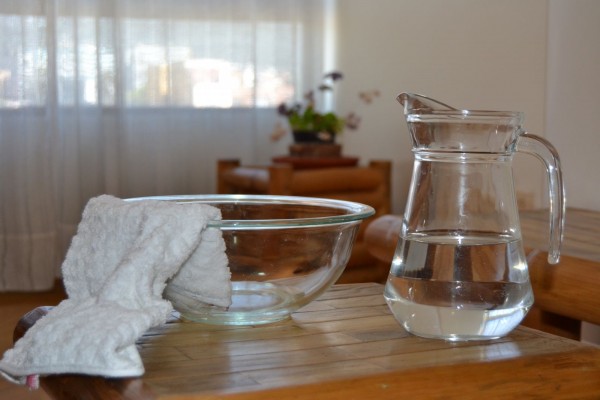
«The smoky plates filled with food are on the table; everything is ready for dinner, which will begin very soon. I would love it if tonight we could manage to be, more than ever, a true family. A group of loyal companions, committed to one another, filled with trust in the meaning and beauty of our message. The truth is that very often we do not know how to put our dreams into practice: there are tensions among us. We do not always understand each other, or understand Jesus. Some days the worst in us —envy, competitiveness, our eagerness to shine, the old ideologies that still live in our hearts, and that divide us— takes hold of our minds and then we quarrel, we hurt one another, and it seems that everything that we have built during all these years will fall apart. Tonight, it should not be like that. Let us celebrate Easter, and our friendship, and our faith. Let’s celebrate our hope, with the joy that we have experienced so often, with Jesus».
The teacher and his closest friends have gathered for the Easter dinner. They are in Jerusalem. In the air of the room where now they begin to enter there is a sense of uncertainty, of anticipation, mixed with the cheerful atmosphere of these special days: many suspect that something unusual is about to happen, but they do not know what to expect. The conflict with the leaders of the city, which has been escalating for months, has reached a new high during these last days, especially since Jesus expelled the merchants and money changers from the temple. All this contributes to create a menacing air, which floats above the group. Nevertheless, today they celebrate.
«We eat and drink, our conversation is lively. We laugh. We are well! For a while it really seems as if we have shunned all the bad omens. After two or three glasses of wine, after filling the stomach with cheese, olives, dates and this delicious lamb, even the clash, perhaps unavoidable, with the High Priests does not seem so terrible anymore, or final, or impossible to face. We have always managed to go on, and this time it will not be different. Judas looks like he’s going through something, that’s for sure. He’s so quiet —although he is usually sullen—tonight his eyes have no life. Well, that’s him. What I cannot deny is that this moment, our sharing, is beautiful: our fraternity is priceless».
They have been together for a few years now, walking with Jesus, whom they met in Galilee. These have been some very intense years, without much time for the group to fall into boredom. Travels, encounters will all kinds of people, endless conversations, quarrels, sweet and bitter moments, and the challenges that the teacher offers them daily. The challenge to review their own preconceptions, to learn how to look at life with new eyes. The challenge to see in others what is hidden: the talents that they did not know how to see in those whom they would naturally despise—foreigners, unbelievers, adversaries—and the selfishness that they did not want to see in those who, in theory, were their friends. Jesus has changed the way they see the world.
«What a fine evening. Every difficult moment, all our concerns and anxieties are worth it, if at the end we can experience times like this one: spaces of real fraternity, friendship and joy. Ah. Jesus stands up, perhaps he wants to say something. Wait a second, what is he doing? Why is he taking off his outer robe and picking up a towel? He kneels! Is he going to wash our feet or what?»
A reverential silence has replaced the hubbub that filled the dining room just a second ago. One can only hear the dripping of the lukewarm water, falling from the vessel to the feet of the disciples and from there to the basin that Jesus keeps placing in front of each one of them. He is in no hurry. He washes the feet of his friends slowly, letting them absorb the moment. They are aware of the intimacy that his gesture creates, so delicate, so profound. They are also surprised and uncomfortable, for he is now taking on this action, usually performed by slaves.
«He kneels in front of Peter and Peter, of course —always he, always unable to keep a thought to himself, although today I do not reproach him anything, for it seems to me that we are all thinking the same— argues, objects to what is happening. They talk, they almost quarrel. Jesus insists. Finally he also washes Simon’s feet. And everyone’s. Now he goes back to his chair, sits down and explains the reason for this strange ceremony».
Only the passing of time, and the perspective they would gain with the dramatic events that would unfold a few hours after that dinner, would allow Jesus’ friends to understand the power of that last act. One day, finally, they would accept that the joy of a community that does not know how to serve is always false. And that authentic love always becomes service.
«The washing of the feet has left all of us a bit astonished. Then Jesus and Judas have had a dispute, and the Iscariot has left the house banging the door. Now we walk through the narrow streets of the holy city, under the stars, on our way to the garden of Gethsemane, where we will spend the night. I have to reflect more on what Jesus wanted to show us by kneeling down with his vessel, his towel and his basin. We leave the city. It is cold, the air smells like cypress, rosemary and jasmine. All is well. All will be well».








